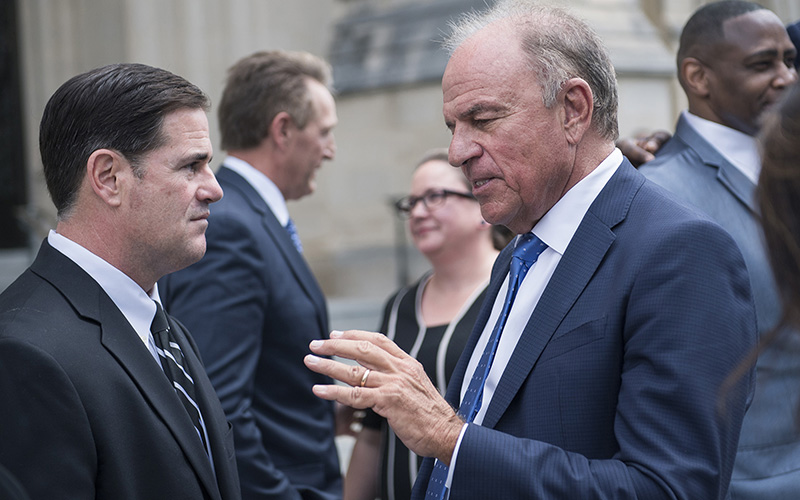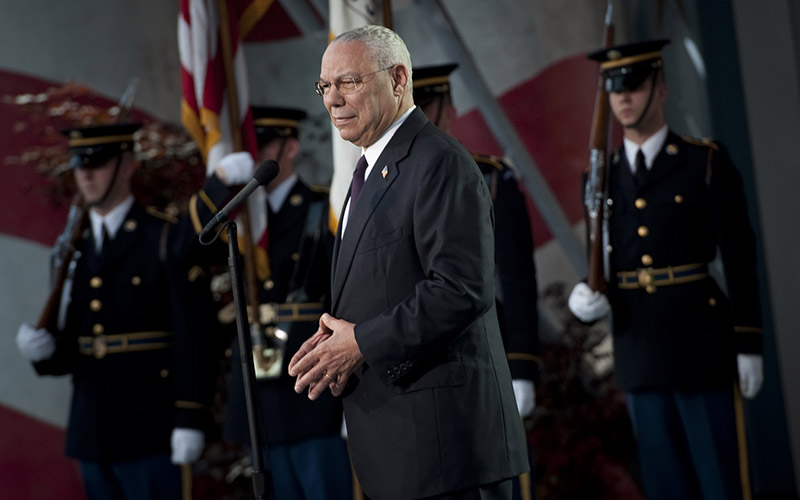
Former Arizona Attorney General Grant Woods, who died over the weekend, got his start in politics as an aide to then-Rep. John McCain. (Photo by Michael Chow/The Arizona Republic)
WASHINGTON – Former Arizona Attorney General Grant Woods was remembered Monday as an “incredibly active public servant” whose sudden death over the weekend had the potential to deal “a pretty big blow” to moderates in the state.
Woods, who died Saturday of a heart attack, served two terms as attorney general, from 1991 to 1999, was a staffer to the late Sen. John McCain, R-Ariz., when McCain was still a member of the House and was active for decades in state Republican politics.
But he broke with the party in later years, endorsing Democrats Hillary Clinton in 2016 and Joe Biden in 2020 over GOP nominee Donald Trump and eventually registering as a Democrat.
Like McCain, Woods will be remembered for “standing his ground, saying it like it is, and putting state and country above all else,” said Jason Rose, a Republican political consultant in Arizona who called Woods “the ultimate umpire.”
Tributes came from both sides of the political aisle. Sen. Mark Kelly, D-Ariz., said Woods “loved Arizona, loved public service and his family” and said he is “leaving his mark on the state and generations of leaders.”
Woods’ wife, Marlene Galan Woods, released a statement that called her husband a “public servant, advocate for the everyday person, lover of music and stories and sports.”
Woods was a graduate of Westwood High School in Mesa and Occidental College, who got his law degree from Arizona State University in 1979. He was a founder of the Mesa Boys & Girls Club, the Mesa Education Foundation and the Mesa Arts Academy, according to a bio on his law firm’s web site.
Mesa Mayor John Giles said in a tweet Sunday that Woods “hired me as a law clerk because, like him, I was a Westwood graduate.”
“He was proud of his Mesa roots,” said Giles, a Republican, pointing to the Boys & Girls Club. “I’ll remember him with respect and gratitude.”
After working in private practice, he became the first chief of staff to then-Rep. John McCain, beginning a lifelong friendship for both men. McCain’s widow, Cindy, tweeted Saturday that Woods “was one of my best friends.”
“My only comfort is knowing (he) is laughing and joking with John now and watching over us,” she said.
Woods was Arizona’s attorney general for two terms, from 1991 to 1999, during which time he was part of a coalition of state attorneys general who negotiated a multibillion-dollar settlement with tobacco companies over the harm their products caused. The settlement also included new restrictions on tobacco advertising and on targeting tobacco to youth, among other requirements.

Former Arizona Attorney General Grant Woods, right, speaks with Gov. Doug Ducey at the 2018 funeral for Sen. John McCain in 2018. Woods, who was on McCain’s congressional staff early in his career, died suddenly Saturday, (Photo by Tom Williams/CQ Roll Call via Getty Images)
While he was talked about as a candidate for other offices, he never ran for office again, but remained active in party politics. Long a moderate, Woods split publicly with the party over Trump’s nomination.
He was a prominent voice among the anti-Trump wing of the party. As recently as last week, when Trump responded to the death of former Secretary of State Colin Powell by saying he “made big mistakes” that would be overlooked by the news media, Woods responded by calling Trump’s statement “repulsive.”
“Vote out anyone who supports this person,” Woods tweeted on Tuesday. “Every single one. It is disqualifying.”
Mike Noble, the chief of research at OH Predictive Insights, said Woods’ death will be a “pretty big blow to the moderate or more centrist wings of the Republican party that was out here in Arizona.” But like most political observers in the state, he said it will not be the end of the movement.
“Grant prioritized country over party and has a strong track record of doing that, and he will be thoroughly missed,” Noble said.
Michael O’Neill, an Arizona pollster and radio host, agreed that it “is probably too strong” to say that Woods’ death means the end of centrist Republicans in the state.
“It has delivered a measurable blow, but to suggest that it’s the end of an attempt to have centrism in the Republican Party in Arizona is way overstated,” O’Neill said.
O’Neill said Woods will be remembered for his “intelligence, his integrity … his willingness, demonstrated by a lifetime of work, to cut across partisan aisles when he encountered a candidate who was just playing better than the one who was offered by his own party.”
Rose called Woods’ death is an “opportunity to celebrate some of the great independent elected officials and leaders that he embodies,” listing Woods as part of a strain of independent Arizona politicians that included Carl Hayden, Barry Goldwater and McCain.
“While his name wasn’t quite as large as those, his spirit sure was,” Rose said.
“He was an example of don’t fear the arena, step into it, and when you do you can be both ferocious and fair,” Rose said, citing Woods’ high-profile break with the party over Trump. “He sung his own song, and they were beautiful lyrics on behalf of the state he loved more than anything else.”


